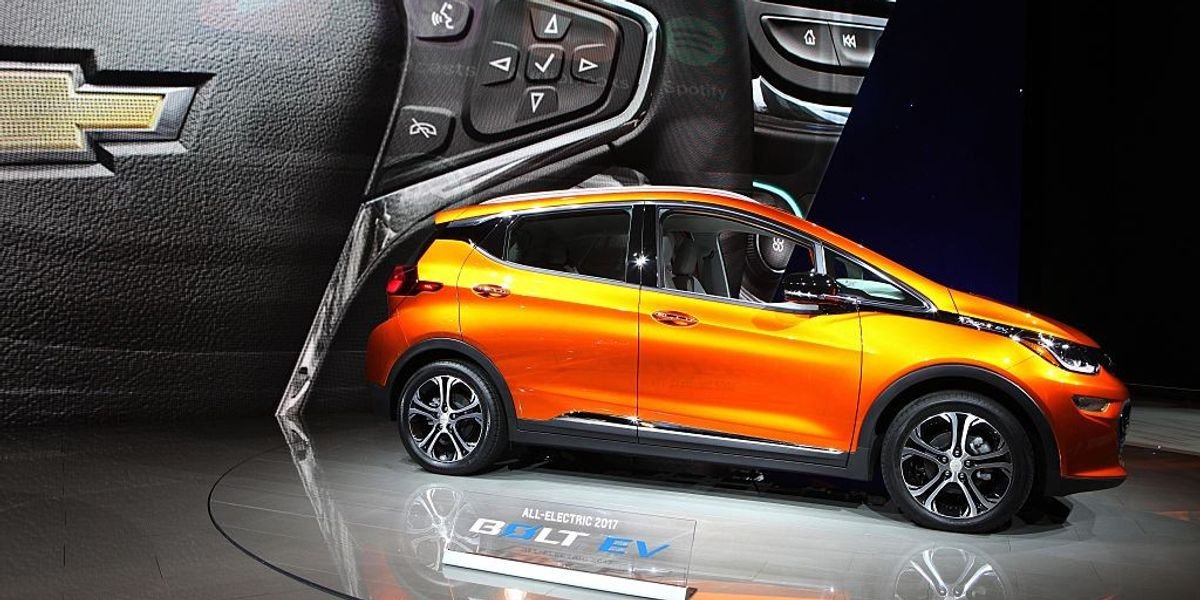
Every day, I work to advance the transition to zero-emission vehicles and away from polluting, gas-powered cars. I got into this work because of a deep concern about climate change. I’m worried that the already hot summers in the U.S. will become completely unbearable. I’m worried about my mom’s house which sits barely above sea level in California. And I’m worried about the communities who are already facing the brunt of climate impacts. When I learned that transportation is responsible for nearly one-third of U.S. greenhouse gas emissions, I knew that I had to work in this space.
The auto industry is at an inflection point. Last year, U.S. EV sales rose 65%, and the International Energy Agency predicts that EVs will account for one in every five vehicle sales globally this year. In mid-2022, a survey by AAA found that almost one-third of millennials are likely to buy an electric vehicle as their next car.
That same survey found that the cost of EVs is holding back 60% of respondents from making the switch.
All cars are getting more expensive: the average price of a new car in the United States was over $48,500 in March. The average new EV is $55,500. With the Inflation Reduction Act, American-made EVs are eligible for a $7,500 tax credit, too.
Most available electric vehicles are pricey trucks and SUVs or luxury cars. When EV demand is booming, automakers should focus on meeting it instead of producing bigger, more costly vehicles. Luckily, I know that EVs cut repair and maintenance costs by 50 percent over similar gas cars—but still, their up-front prices are daunting.
The EV I have my eye on, the Chevy Bolt, has a sticker price of $26,500. With tax credits, that drops to $19,000—far less than many gas-powered cars. GM markets the Bolt as “America’s most affordable EV.”
The “replacement” is the Equinox EV, which GM has admitted will come in “above” $30,000. That’s at least a $3,500 difference in sticker price. GM is retooling the Bolt plant to produce bigger electric pickups that fewer people can afford. That’s hardly the behavior of a company making “EVs for Everyone.”
GM is also falling behind on its EV targets, and analysts believe it will miss a goal of 400,000 EV deliveries in North America by 2024. The Bolt drove the company’s record-breaking EV sales in the first quarter of this year: GM has delivered two Hummer EVs, 968 Cadillac Lyriqs, and 19,700 Bolts. So why pull the Bolt off the market?
If GM falls short of its production targets and kills the Bolt—a car that’s selling by the thousands every month—it’ll have ripple effects that impact consumers into the aftermarket, too. Most Americans buy used cars, and used EVs now have their first federal tax incentive.
I would expect to see other affordable EVs out there, perhaps from Toyota, which captured the millennial market with its eco-friendly Prius 20 years ago. But Toyota has only one electric vehicle for sale in the U.S., the bZ4x, which debuted to mediocre reviews and a high price tag starting at $42,000. Just over 1,000 bZ4x sold in 2022.
Toyota is also fighting the EV transition at every turn. The past two years, Toyota was ranked the automaker with the worst impact on climate policy globally for its lobbying—actions like threatening to cease manufacturing cars in the U.K. if the country didn’t water down its strong clean car rules. Toyota backed off only after a newspaper exposed the threat.
Toyota gained its foothold in the U.S. making affordable, compact cars, while Chevrolet has long been the car of working American families. Since Model Ts started rolling off the assembly line, automakers have found ways to improve manufacturing processes and cut costs.
Car companies are capable of meeting this moment by selling good, affordable EVs. And increasingly, they’ll be required to: The UK, EU, and eight U.S. states have banned the sale of fossil-fueled vehicles by 2035, and more will follow suit.
Automakers have solved problems of affordability and engineering before. They did it with gas-powered cars in the 20th century. Now they need to invest in EVs and produce vehicles that Americans — in particular millennials and Gen-Zers who will be driving for the next 50 years — can actually afford. Our planet requires it, and drivers like me are demanding it.
Our work is licensed under Creative Commons (CC BY-NC-ND 3.0). Feel free to republish and share widely.
_______
ABOUT THE AUTHOR
East Peterson-Trujillo is the Clean Vehicles Campaigner at Public Citizen.


While interesting this article misses some important points. GM/Chevy screwed their customers when they put in batteries from a failing manufacturer and when they failed charged the customer a hideous price to replace: more than the car is worth. Tesla has, not as bad, but way too high cost when battery replacement is inevitable.
Nissan, with the Leaf is rational 5,000 because it’s one big battery. But for some reason it doesn’t sell as well. Nissan makes great cars, with some caveats as with all builders. (Like odd size belts.)
Availability problems is due to constant anti EV propaganda pushed by Neanderthals’ who would have urinated on the automobile when they first went to gas. Check out what one of the Studebaker brothers said about gas cars, and at the time he was right…
“Gasoline-powered cars are clumsy, dangerous, noisy brutes that stink to high heaven and break down at the worst possible moment.”
Progress takes time, and our electrics now are FAR beyond the severe problems gas cars.
Also I am guessing they’re intentionally making them special order, rare, to keep the price higher...